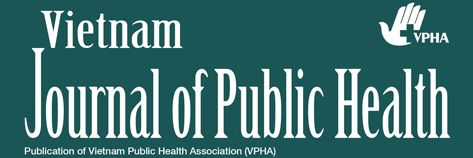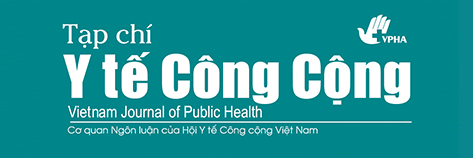Một số yếu tố liên quan đến hành vi tự khám vú tại nhà ở phụ nữ độ tuổi 15-49 tại xã Hưng Đạo, huyện Tứ Kỳ, tỉnh Hải Dương (Relative factors to the breast self-exam behavior of women aged 15 – 49 in Hung Dao commune, Tu Ky district, Hai Duong province)
Tóm tắt
Ung thư vú là một vấn đề sức khỏe đáng quan tâm ở phụ nữ. Hiểu biết về kiến thức, thái độ, thực hành của người phụ nữ là những thông tin cần thiết để xây dựng một chương trình dự phòng ung thư vú dựa vào cộng đồng. Trường Đại học Y tế Công cộng đã tiến hành một điều tra cắt ngang bằng hỏi phỏng vấn trên 600 phụ nữ tuổi từ 15-49 để tìm hiểu về kiến thức, thái độ, thực hành của họ về dự phòng ung thư vú. Bài viết này tập trung mô tả hành vi tự khám vú của phụ nữ trong độ tuổi sinh đẻ tại địa bàn nghiên cứu cũng như một số yếu tố liên quan đến hành vi đó.
Kết quả nghiên cứu cho thấy, tỷ lệ đối tượng nghiên cứu được đánh giá là có kiến thức đạt về dự phòng ung thư vú là 42,5%. Hành vi tự khám vú tại nhà là khá phổ biến, có đến 64,7% đối tượng báo cáo đã từng khám vú tại nhà. Tuy nhiên, chỉ 0,5% đối tượng tuân theo đầy đủ các bước tự khám vú được WHO khuyến cáo. Kết quả phân tích đơn biến và hồi quy logistic đều cho thấy kiến thức tốt về dự phòng ung thư vú có mối liên quan với hành vi tự khám vú tại nhà của người phụ nữ. Từ đó, một chương trình giáo dục sức khỏe tăng cường kiến thức về dự phòng ung thư vú là cần thiết để khuyến khích hành vi tự khám vú tại nhà, khám vú tại cơ sở y tế và duy trì một lối sống khỏe mạnh; qua đó giảm tỷ lệ tử vong do ung thư vú ở phụ nữ.
English abstract
Breast cancer is one of the most important issue among women’s health related problems. Information on womens knowledge, attitude and behavior on breast cancer prevention is nessesary for developing a community-based prevention model for breast cancer. Hanoi School of Public Health conducted a cross-sectional study on 600 women aged 15 – 49 to explore their knowledge, attitude and behavior on breast cancer prevention. This paper explores whether the breast self-exam behavior in women is common in study area as well as some determinants of the behavior.
The study shows that the proportion of women who met the requirements of knowledge on breast cancer prevention was 42.5 percent. Breast self exam is common among participants, 64.7 percent of them reported doing breast self exam at home. Only 0.5 percent of those women, however, followed the screening guideline of WHO. Bivariate and logistic analysis demonstrated the association between womens knowledge on breast cancer prevention and their breast self exam behavior. So, a health education is needed to enhance womens knowledge on breast cancer prevention and to encourage women to do breast self exam at home, to get a clinical breast exam and hopefully result in reducing the fatal deaths of breast cancer.
Từ khóa
Toàn văn:
PDF (English)##submission.citations##
PGS Nguyễn Chấn Hùng (2004), Ung thư học nội khoa, NXB Y học TP. HCM, 18-19.
Health Bridge và Hội Y tế Công cộng Việt Nam (2006). Nghiên cứu ban đầi trong dự án “Làm giảm sự chấp nhận của xã hội với tình trạng hút thuốc tại Việt Nam”.
Christine Paul, Flora Tzelepis, Raoul A. Walsh, Afaf Girgis, Lesley King, Jeanie McKenzie (2003). Has the Investment in Public Cancer Education Delivered Observable Changes in Knowledge over the Past 10 Years?. 97 (9): 2931 – 2939
Ferlay J, Bray F, Parkin DM, Pisani P, eds (2001). Globocan 2000: Cancer Incidence and Mortality Worldwide. IARC Press 155
Georgia R Sadler, Lisa T Ryujin, Celine Marie Ko and Emily Nguyen (2001). Korean women: breast cancer knowledge, attitudes and behaviors. BioMed Central. 7 (2): 4 –
Georgia R Sadler, Celine M Ko, Jennifer A Cohn, Monique White, Rai-nesha Weldon and Phillis Wu (2007). Breast cancer knowledge, attitudes, and screening behaviors among African American women: the Black cosmetologists promoting health program. BioMed Central 7 (8): 1 – 8.
Parkin DM, Pisani P, Ferlay J (1999) Estimates of the worldwide incidence of 25 major cancers in 1990. Int J Cancer, 80: 827-841
V. L. Flax and J. L. Earp (1999). Counseled women's perspectives on their interactions with lay health advisors: a feasibility study. Oxford J. 14 (10): 15 - 24



